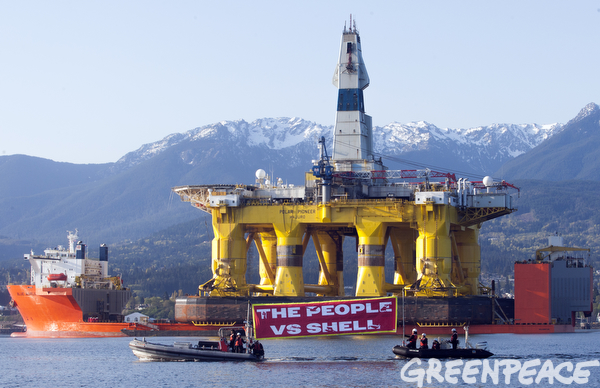A Dramatic Turnaround
Shell Retreats from Drilling in Alaska
October 5, 2015 | Revolution Newspaper | revcom.us

This spring and summer, a worldwide movement grew to stop Arctic drilling. Above, kayakers protest the Shell Oil drill rig in Seattle, May 11. Photo: Greenpeace
On September 28, Shell Oil announced it was ending exploration for oil in the Alaskan Arctic “for the foreseeable future.”
This was extremely welcome news to all those who care about the environment and the future of our planet. It is a dramatic turnaround after a year in which Shell relentlessly pursued Arctic drilling despite intense resistance and widespread condemnation from people worldwide. What this means is that at least for now, the ecosystems and wild species of the Chukchi Sea will not be under immediate threat of killing oil spills. And a venture that could open the way for truly catastrophic climate change has been set back for now. This is cause for celebration! Activists literally danced in the streets in Seattle and London. The actress Emma Thompson joined with Greenpeace in London to celebrate and call for continuing the fight to stop all Arctic drilling.
At the same time, the battle to completely stop Arctic drilling, and to stop destruction of the environment overall, is just beginning and needs to quickly generate momentum. The Arctic is not safe! The same forces that drove Shell to attempt to drill there continue to drive the oil exploration and drilling that are exacerbating an environmental emergency.
The Risky Calculations of Capitalism

This Revolution special issue focuses on the environmental emergency that now faces humanity and Earth’s ecosystems. In this issue we show:
- the dimensions of the emergency...
- the source of its causes in the capitalist system, and the impossibility of that system solving this crisis...
- a way out and way forward for humanity—a revolutionary society in which we could actually live as custodians of nature, rather than as its plunderers.
Read online....
Also available in brochure format (downloadable PDF)
From the viewpoint of the interests of the people of the planet and preserving the planet’s environment, drilling in the Arctic was—and is—lunacy from the word go. The damage drilling could bring to the Arctic environment, to the lives and culture of the indigenous Inupiat people, and escalating the climate crisis means even seriously considering drilling should have been out of the question. Any rational person starting from the interests of humanity would say to those contemplating this: “You melted the Arctic, you’re taking the climate and humanity into a disaster zone, and you want to seize on this destruction to get your hands on more oil to burn and cause even worse destruction? Are you insane?”
But Shell and all the other capitalists don’t operate out of these concerns. They’re driven by the rules of this dog-eat dog system, of capitalism, to expand or die. To sink their teeth into new potential sources of profit before their competitor or rival gets to bite. This involves enormous risk of advance or setback to these capitalists, even the danger of crashing and burning while others take their place.
From the beginning, Shell’s Arctic project was a risky venture. The difficulty of drilling in seas that are ice-covered most of the year and subject to intense storms, the high costs involved, etc., make Arctic drilling a big risk for any oil company. Shell calculated it was worth the risk. It sunk more than $7 billion into this project and may now lose $4 billion or even more. Shell gambled. Other energy companies were not sure the risk was worth it. They waited in the wings to see if Shell would fail or prosper.
Shell promised the U.S. it would open the way to a huge new Arctic gold rush into the richest remaining fossil fuel reserves on the planet, buried under the often ice-covered and stormy Arctic Ocean. Shell and the U.S. saw this as a way to advance U.S. energy needs and “independence,” a code word for U.S. domination of world economies through control of oil supplies. Obama’s administration backed Shell up, granting permits and shepherding them through the process. The fact that this venture and the dangers tied up with it been set back is a very good thing.
But this is not over. The necessity for the U.S. and all the world powers to exploit the oil and gas reserves, to expand military power into the newly opening Arctic waters, and to control shipping lanes has not ended and will continually reassert itself in coming years and decades. For Shell’s part, a company spokesperson did not close the book on future drilling, saying, “Shell continues to see important exploration potential in the basin, and the area is likely to ultimately be of strategic importance to Alaska and the U.S.”
Why Shell Is Quitting the Arctic... for Now
Shell said it had decided to stop because it had not found a significant amount of oil in this summer’s explorations, the costs were too high, and federal regulations governing drilling there were too “challenging and unpredictable.”
Digging more deeply, there are a number of interrelated factors underlying Shell’s decision to stop drilling. It is clear that in part, Shell is making a cost-benefit analysis that the investments it is making are not likely to pay off, at least in the current environment. Shell has sunk a lot of money into this project and would likely have to invest a lot more to find significant amounts of oil and it still might not. There was a real danger that this could have become a more catastrophic loss for Shell, especially at a time when world oil prices have dropped, cutting into profitability. An oil and gas analyst at the Economist magazine “Intelligence Unit” said, “Arctic exploration has been a clear casualty of the oil price slump.” Norway and Russia have recently postponed or abandoned Arctic oil and gas projects, while BP and Husky Energy have also recently stopped some offshore drilling projects to cut their losses.
But the question of costs has also been influenced by the determined protests and growing worldwide condemnation against Shell and Arctic drilling. Deutsche Bank analysts said Shell’s “entire episode has been a very costly error for the company both financially and reputationally.”
This spring and summer, a worldwide movement grew to stop Arctic drilling. The spearpoint of this was determined and imaginative protests by environmentalists in Seattle, Portland, Everett, and elsewhere. Kayakers, climbers, and marchers courageously defied authorities and blocked Shell drilling rigs, ships, and work sites. The protests rallied public opinion worldwide. Millions of people saw right on the side of those who stood up to save the Arctic in the face of suppression and arrests by the Coast Guard and local police forces.
Shell went forward with drilling anyway, approved by the Obama administration. Shell’s and Obama’s false claims that they were prudently “balancing energy needs with those of the environment” stood increasingly exposed as a sham, and their legitimacy suffered a real blow.
The UK Guardian reported that while Shell publicly had appeared upbeat about the oil reserves it was about to tap into, privately the company had begun to “admit that it had been surprised by the popular opposition it faced.” Further, the growing condemnation of Shell and drilling in the Arctic was undermining the “environmentally friendly” façade Shell has tried to cast itself with. Shell had been tossed out of an influential corporate climate change group, and the company’s chief executive reportedly was “worried that the row over the Arctic was undermining his attempts to influence the debate around how to tackle climate change.”
Shell now produces more gas than oil, and has been advocating for gas as a “transitional fuel” for lowering carbon emissions. This is a position in line with furthering Shell’s position to beat out other energy companies.
And lest anyone think Shell is moving away from exploiting fossil fuels, part of the reason for quitting the Arctic is so it can focus more on taking over the gas group BG, and get hold of its danger-fraught drilling in the deep offshore waters off Brazil! Shell’s Arctic operations were making it so that no one took seriously its claim to be acting to prevent climate change. Increasingly, the whole Arctic operation was becoming a big liability for Shell.
The international attention, controversy, and exposure generated by the determined, courageous struggle against Shell drilling in the Arctic was tremendously important. It was a factor in Shell’s calculations in quitting the Arctic (although we need to add, for now). And it focused international attention on the environmental emergency, sounding an alarm, and awakening and arousing people against the crimes being carried out against the environment.
At the same time and more fundamentally, the drive for domination of the Arctic by the world’s capitalist powers and interests rages on, despite Shell’s retreat (for now) from the Arctic. This can only be stopped once and for all by putting an end to the capitalist-imperialist system itself through revolution. It’s crucial we advance from here to struggle to stop the destruction of the environment, as part of building a movement for revolution.
Volunteers Needed... for revcom.us and Revolution
If you like this article, subscribe, donate to and sustain Revolution newspaper.

 This system and those who rule over it are not capable of carrying out economic development to meet the needs of the people now, while balancing that with the needs of future generations and requirements of safeguarding the environment. They care nothing for the rich diversity of the earth and its species, for the treasures this contains, except when and where they can turn this into profit for themselves....These people are not fit to be the caretakers of the earth.
This system and those who rule over it are not capable of carrying out economic development to meet the needs of the people now, while balancing that with the needs of future generations and requirements of safeguarding the environment. They care nothing for the rich diversity of the earth and its species, for the treasures this contains, except when and where they can turn this into profit for themselves....These people are not fit to be the caretakers of the earth.





